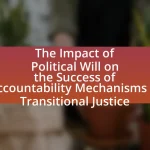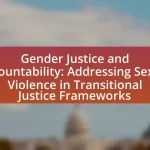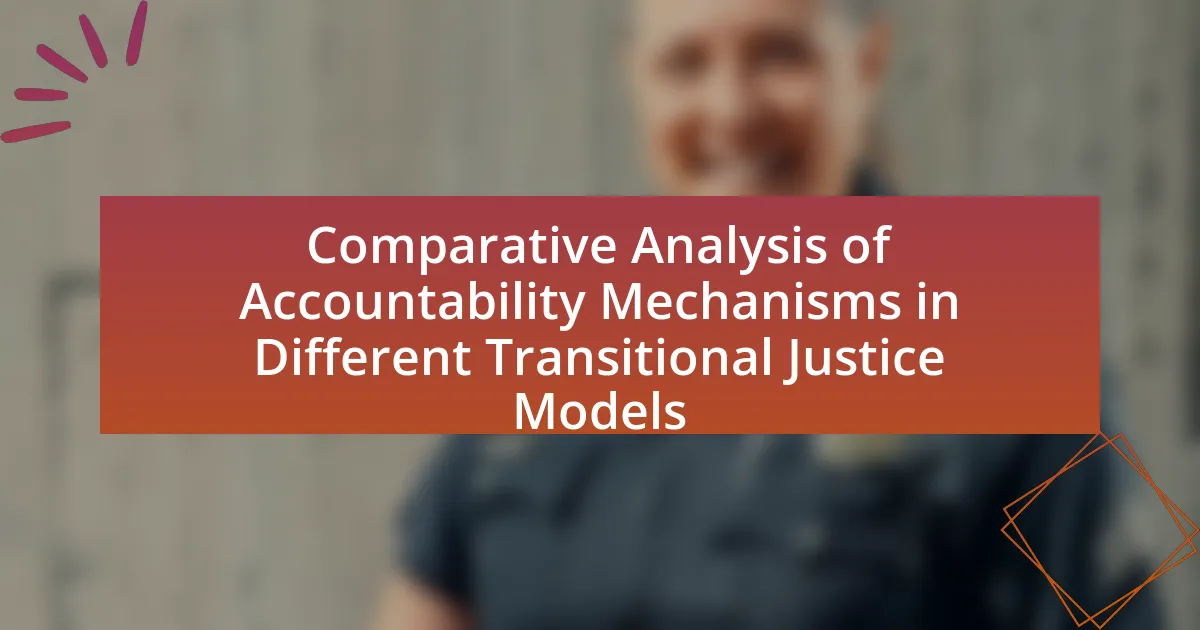Truth commissions are official bodies established to investigate human rights violations and atrocities, primarily in post-conflict societies. This article evaluates the effectiveness of truth commissions in promoting accountability, examining their purpose, operational processes, and the challenges they face. Key factors influencing their success, such as political will, public participation, and the legal framework, are discussed alongside mechanisms for gathering testimonies and ensuring accountability. Additionally, the article highlights best practices and lessons learned from successful truth commissions worldwide, emphasizing the importance of inclusivity and transparency in achieving lasting societal healing and justice.
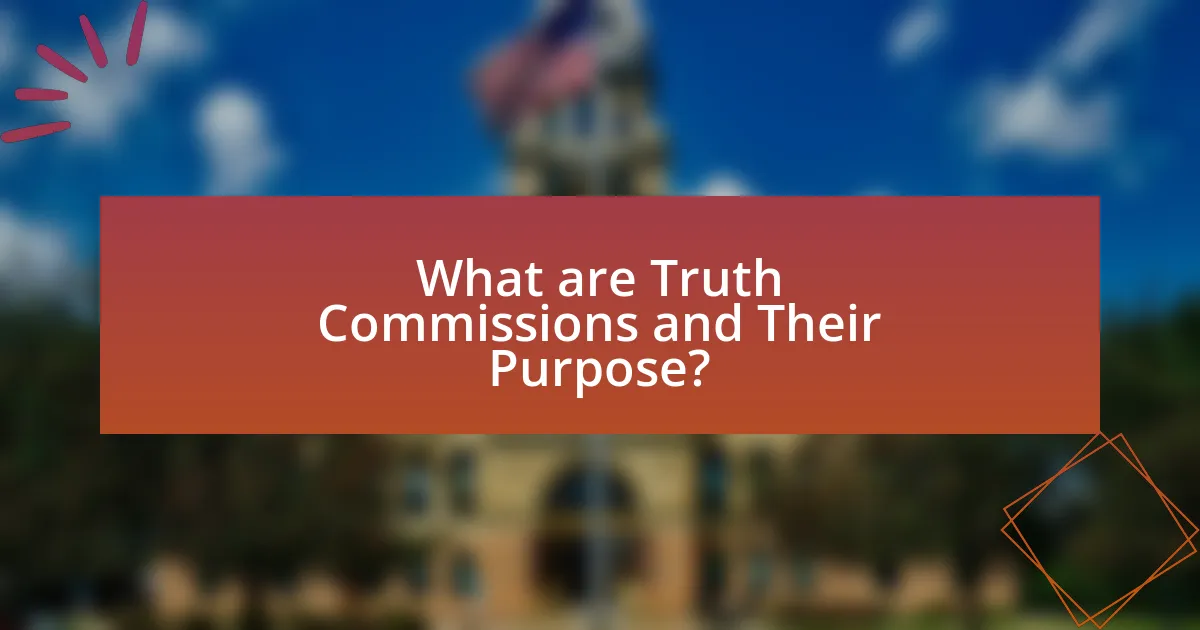
What are Truth Commissions and Their Purpose?
Truth commissions are official bodies established to investigate and report on human rights violations and atrocities that occurred during a specific period, often in the context of political conflict or authoritarian rule. Their primary purpose is to uncover the truth about past abuses, promote accountability, and facilitate reconciliation within societies recovering from trauma. For instance, the South African Truth and Reconciliation Commission, established in 1995, aimed to address the injustices of apartheid by documenting human rights violations and providing a platform for victims and perpetrators to share their experiences, thereby fostering national healing and understanding.
How do Truth Commissions function in post-conflict societies?
Truth commissions function in post-conflict societies by investigating and documenting human rights violations that occurred during periods of conflict. These commissions aim to uncover the truth about past atrocities, promote reconciliation among affected communities, and provide a platform for victims to share their experiences. For instance, the South African Truth and Reconciliation Commission, established in 1995, facilitated public hearings where victims and perpetrators could testify, contributing to a national narrative about apartheid-era abuses. This process not only helped to acknowledge the suffering of victims but also aimed to foster accountability by recommending reparations and legal actions against perpetrators. The effectiveness of truth commissions in promoting accountability is often measured by their ability to influence legal reforms and societal attitudes towards justice and reconciliation.
What processes are involved in the establishment of a Truth Commission?
The establishment of a Truth Commission involves several key processes, including the mandate creation, stakeholder engagement, and operational setup. Initially, a government or relevant authority defines the commission’s mandate, outlining its objectives, scope, and duration. This is often followed by engaging various stakeholders, such as victims, civil society organizations, and political entities, to ensure broad representation and support. Subsequently, the operational setup includes appointing commissioners, establishing a framework for investigations, and securing necessary resources. These processes are crucial for ensuring the commission’s legitimacy and effectiveness in addressing past human rights violations, as evidenced by the successful models in countries like South Africa and Argentina, where comprehensive stakeholder involvement and clear mandates led to impactful outcomes.
How do Truth Commissions gather and document testimonies?
Truth Commissions gather and document testimonies through structured interviews, public hearings, and written submissions from victims and witnesses. These processes are designed to create a comprehensive record of human rights violations and promote transparency. For instance, the South African Truth and Reconciliation Commission utilized public hearings to allow individuals to share their experiences, which were then transcribed and archived, ensuring that testimonies were accessible for future reference and analysis. This method not only validates individual accounts but also contributes to a collective historical narrative, reinforcing the commission’s role in accountability and reconciliation.
What role do Truth Commissions play in promoting accountability?
Truth Commissions play a crucial role in promoting accountability by investigating human rights violations and providing a platform for victims to share their experiences. These commissions facilitate the documentation of abuses, which helps establish a historical record and acknowledges the suffering of victims. For instance, the South African Truth and Reconciliation Commission, established in 1995, revealed extensive human rights violations during apartheid, leading to public acknowledgment and some degree of accountability for perpetrators. By promoting transparency and fostering dialogue, Truth Commissions contribute to societal healing and the establishment of legal frameworks that discourage future violations.
How do Truth Commissions address human rights violations?
Truth Commissions address human rights violations by investigating past abuses, documenting testimonies, and providing a platform for victims to share their experiences. These commissions aim to uncover the truth about systematic violations, often in post-conflict societies, and promote accountability by recommending legal actions against perpetrators. For instance, the South African Truth and Reconciliation Commission, established in 1995, revealed extensive human rights abuses during apartheid, leading to public acknowledgment and some prosecutions. By fostering dialogue and understanding, Truth Commissions contribute to national healing and the prevention of future violations.
What mechanisms do Truth Commissions use to ensure accountability?
Truth Commissions ensure accountability through mechanisms such as public hearings, documentation of human rights violations, and recommendations for legal action. Public hearings allow victims and perpetrators to share testimonies, creating a historical record that holds individuals accountable for their actions. Documentation of human rights violations provides evidence that can be used in legal proceedings, reinforcing the need for accountability. Additionally, recommendations for legal action often include suggestions for prosecuting offenders, thereby promoting justice and accountability within the legal framework. These mechanisms have been utilized in various Truth Commissions, such as the South African Truth and Reconciliation Commission, which documented abuses during apartheid and recommended prosecutions, demonstrating their effectiveness in promoting accountability.
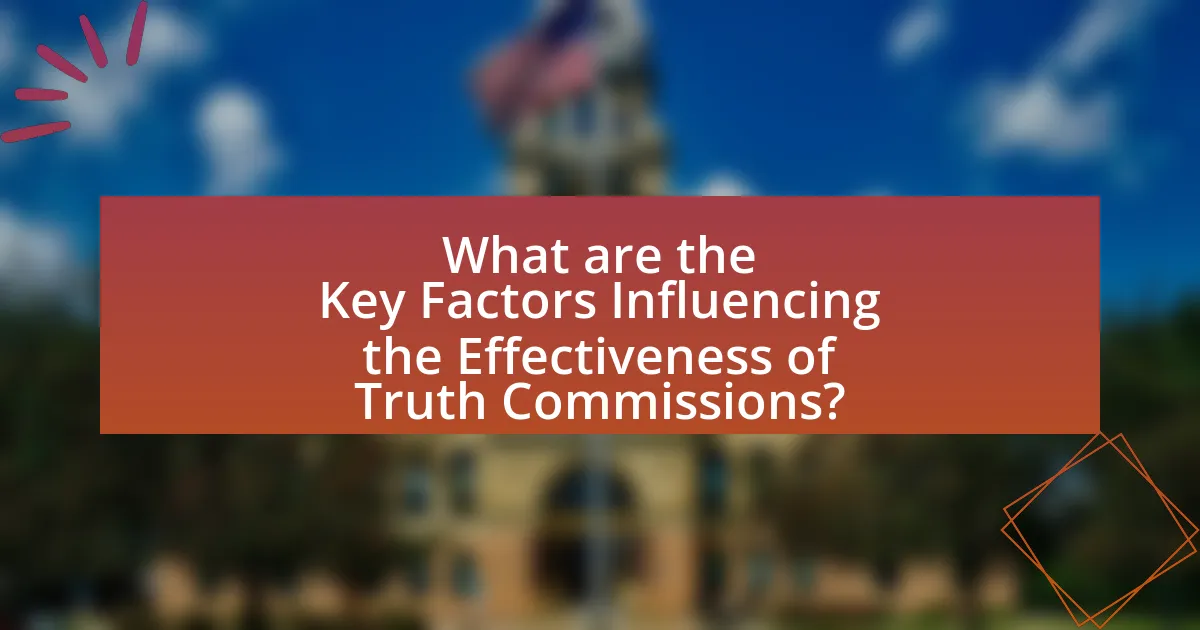
What are the Key Factors Influencing the Effectiveness of Truth Commissions?
The key factors influencing the effectiveness of truth commissions include political will, public participation, the legal framework, and the commission’s mandate. Political will is crucial as it determines the extent to which government authorities support the commission’s findings and recommendations; for instance, in South Africa, the political backing for the Truth and Reconciliation Commission significantly impacted its outcomes. Public participation enhances legitimacy and trust, as seen in the participatory approach of the Sierra Leone Truth and Reconciliation Commission, which encouraged community involvement. A robust legal framework ensures that the commission operates within established laws, providing it with the authority to investigate and recommend actions, as demonstrated by the legal provisions in the Chilean National Commission on Truth and Reconciliation. Lastly, a clear and focused mandate allows the commission to address specific issues effectively, which was evident in the case of the El Salvador Truth Commission, where its targeted approach led to significant findings on human rights violations.
How does political will impact the success of Truth Commissions?
Political will is crucial for the success of Truth Commissions, as it determines the extent to which government officials support and implement the commission’s recommendations. When political leaders demonstrate commitment, Truth Commissions can effectively investigate human rights violations, promote transparency, and foster public trust. For instance, in South Africa, the political will exhibited by Nelson Mandela and the African National Congress facilitated the Truth and Reconciliation Commission’s work, leading to significant societal healing and acknowledgment of past atrocities. Conversely, a lack of political will can result in insufficient funding, limited access to information, and inadequate enforcement of recommendations, undermining the commission’s objectives. Historical examples, such as the failure of the Truth Commission in Guatemala, illustrate how weak political support can hinder accountability and justice.
What examples illustrate the importance of political support?
Political support is crucial for the success of truth commissions, as demonstrated by the South African Truth and Reconciliation Commission (TRC) and the Guatemalan Commission for Historical Clarification. The South African TRC, established in 1995, received strong backing from the post-apartheid government, which facilitated its operations and encouraged public participation, leading to significant national healing and acknowledgment of past atrocities. In contrast, the Guatemalan Commission, formed in 1997, struggled with limited political support, resulting in inadequate implementation of its recommendations and a lack of accountability for human rights violations. These examples illustrate that robust political backing can enhance the effectiveness of truth commissions in promoting accountability and reconciliation.
How can lack of political will hinder accountability efforts?
Lack of political will significantly hinders accountability efforts by preventing the implementation of necessary reforms and actions. When political leaders do not prioritize accountability, it results in insufficient support for truth commissions, investigations, and legal proceedings against perpetrators of human rights violations. For instance, in countries like Argentina and South Africa, political will was crucial for the success of truth commissions, as it enabled the establishment of legal frameworks and public support for accountability measures. Conversely, in nations where political leaders resist accountability, such as in some post-conflict settings, the absence of political will leads to impunity, undermining the effectiveness of truth commissions and eroding public trust in governance.
What is the role of public participation in Truth Commissions?
Public participation in Truth Commissions is crucial for ensuring transparency, legitimacy, and inclusivity in the process of addressing past human rights violations. By involving the public, Truth Commissions can gather diverse testimonies and perspectives, which enrich the understanding of the events under investigation. For instance, the South African Truth and Reconciliation Commission engaged thousands of citizens, allowing for a broader narrative that reflected the experiences of various communities affected by apartheid. This participatory approach not only fosters a sense of ownership among the populace but also enhances the credibility of the Commission’s findings, as seen in the positive reception of its final report.
How does community engagement affect the outcomes of Truth Commissions?
Community engagement significantly enhances the outcomes of Truth Commissions by fostering trust, increasing participation, and ensuring that diverse perspectives are represented. When communities actively engage in the process, they contribute valuable local knowledge and experiences, which can lead to more comprehensive and accurate findings. For instance, the South African Truth and Reconciliation Commission demonstrated that community involvement not only facilitated the collection of testimonies but also helped in healing societal wounds, as evidenced by the increased public support for the commission’s recommendations. Furthermore, studies indicate that higher levels of community engagement correlate with greater public acceptance of the commission’s findings and recommendations, ultimately promoting accountability and reconciliation.
What strategies can enhance public involvement in the process?
Strategies that can enhance public involvement in the process include fostering transparency, utilizing technology for engagement, and implementing community outreach initiatives. Transparency in the operations of truth commissions allows the public to understand the processes and decisions being made, which builds trust and encourages participation. Technology, such as online platforms and social media, can facilitate broader engagement by providing accessible channels for feedback and information sharing. Community outreach initiatives, including workshops and public forums, can actively involve citizens in discussions and decision-making, ensuring diverse perspectives are represented. These strategies have been shown to increase public trust and participation, as evidenced by successful truth commissions in countries like South Africa and Canada, where inclusive practices led to higher levels of community engagement and accountability.
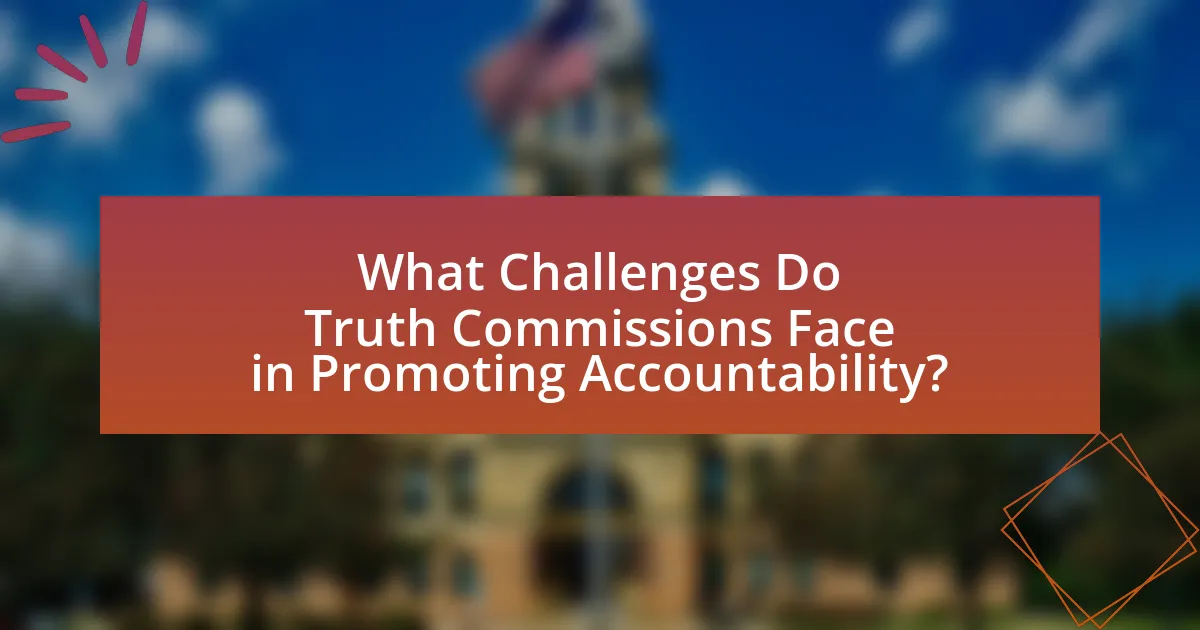
What Challenges Do Truth Commissions Face in Promoting Accountability?
Truth commissions face significant challenges in promoting accountability, primarily due to political resistance, lack of cooperation from state actors, and limited enforcement power. Political resistance often arises from those in power who may fear repercussions from the findings, leading to obstruction of the commission’s work. For instance, in countries like South Africa, despite the Truth and Reconciliation Commission’s efforts, some political leaders were reluctant to fully embrace accountability measures. Additionally, lack of cooperation from state actors can hinder investigations, as seen in Guatemala, where military officials often refused to testify. Finally, truth commissions typically lack the authority to enforce legal actions, relying instead on existing judicial systems, which may be compromised or ineffective, as evidenced by the challenges faced by the Sierra Leone Truth and Reconciliation Commission in prosecuting war crimes. These factors collectively undermine the ability of truth commissions to achieve their accountability objectives.
What are the common obstacles encountered by Truth Commissions?
Truth Commissions commonly encounter obstacles such as lack of political will, insufficient funding, and societal resistance. Lack of political will often manifests when governing bodies do not support the commission’s findings or recommendations, undermining its authority and effectiveness. Insufficient funding can limit the commission’s ability to conduct thorough investigations and outreach, as seen in the case of the South African Truth and Reconciliation Commission, which faced budget constraints that affected its operations. Societal resistance may arise from groups that oppose the commission’s objectives, leading to threats or violence against its members, as experienced by the Guatemalan Truth Commission, which faced significant pushback from powerful sectors within society. These obstacles hinder the ability of Truth Commissions to fulfill their mandate of promoting accountability and reconciliation.
How do societal divisions impact the effectiveness of Truth Commissions?
Societal divisions significantly hinder the effectiveness of Truth Commissions by creating an environment of distrust and polarization among different groups. When a society is divided along ethnic, political, or social lines, the willingness of individuals to participate in the truth-telling process diminishes, as they may fear retribution or believe that the commission is biased. For instance, in South Africa, the Truth and Reconciliation Commission faced challenges due to deep racial divides, which affected the extent to which victims and perpetrators engaged with the process. Additionally, societal divisions can lead to competing narratives about the past, complicating the commission’s ability to establish a shared understanding of historical events. This fragmentation often results in limited public support for the commission’s findings, undermining its authority and impact on promoting accountability.
What are the limitations of Truth Commissions in addressing systemic issues?
Truth Commissions have significant limitations in addressing systemic issues, primarily due to their focus on individual cases rather than broader structural problems. These commissions often prioritize documenting specific human rights violations and providing a platform for victims, which can lead to a lack of comprehensive analysis of the underlying systemic factors that contribute to such violations. For instance, the South African Truth and Reconciliation Commission, while successful in uncovering individual atrocities, struggled to address the entrenched socio-economic inequalities and institutional racism that persisted post-apartheid. Additionally, Truth Commissions may lack the authority to implement reforms or hold systemic actors accountable, limiting their effectiveness in fostering long-term change. This inability to influence policy or institutional practices further underscores their challenges in tackling systemic issues comprehensively.
How do Truth Commissions interact with other accountability mechanisms?
Truth Commissions interact with other accountability mechanisms by complementing judicial processes and fostering societal reconciliation. They often provide a platform for victims to share their experiences, which can inform legal proceedings and enhance the legitimacy of judicial outcomes. For example, the South African Truth and Reconciliation Commission’s findings were used to support prosecutions of human rights violations, demonstrating how truth commissions can provide critical evidence and context for accountability. Additionally, truth commissions can promote restorative justice by encouraging dialogue and understanding, which can coexist with punitive measures, thereby addressing both individual accountability and broader societal healing.
What is the relationship between Truth Commissions and judicial processes?
Truth Commissions and judicial processes are complementary mechanisms for addressing human rights violations and promoting accountability. Truth Commissions focus on uncovering the truth about past atrocities, documenting experiences, and fostering reconciliation, while judicial processes aim to hold perpetrators legally accountable through prosecution and punishment. For instance, the South African Truth and Reconciliation Commission (TRC) operated alongside judicial efforts to address apartheid-era crimes, highlighting how both systems can work together to achieve justice and societal healing. This relationship underscores the importance of integrating truth-telling with legal accountability to effectively address historical injustices and promote long-term peace.
How can Truth Commissions complement reparations programs?
Truth Commissions can complement reparations programs by providing a platform for truth-telling, which enhances the legitimacy and effectiveness of reparations. By documenting human rights violations and acknowledging the suffering of victims, Truth Commissions create a historical record that validates the claims of those seeking reparations. For instance, the South African Truth and Reconciliation Commission (TRC) not only facilitated public testimonies but also informed reparations policies by identifying victims and recommending compensation measures. This synergy fosters a holistic approach to justice, ensuring that reparations are not merely financial but also symbolic, addressing the broader need for recognition and healing in post-conflict societies.
What best practices can enhance the effectiveness of Truth Commissions?
Best practices that can enhance the effectiveness of Truth Commissions include ensuring broad public participation, maintaining independence from political influence, and providing adequate resources for operations. Broad public participation fosters trust and legitimacy, as seen in South Africa’s Truth and Reconciliation Commission, which engaged diverse communities and stakeholders. Independence from political influence is crucial for impartiality; for instance, the Chilean Truth Commission operated with a mandate free from governmental interference, allowing for more credible findings. Adequate resources, including funding and trained personnel, are essential for thorough investigations and outreach, as demonstrated by the successful operations of the Sierra Leone Truth and Reconciliation Commission, which had sufficient backing to conduct extensive hearings and documentation.
What lessons can be learned from successful Truth Commissions worldwide?
Successful Truth Commissions worldwide demonstrate that transparency, inclusivity, and a focus on healing are essential for promoting accountability. For instance, the South African Truth and Reconciliation Commission (TRC) effectively utilized public hearings to foster transparency, allowing victims to share their experiences, which helped build a collective narrative of the past. Additionally, the TRC’s emphasis on inclusivity, involving diverse community voices, ensured that various perspectives were acknowledged, promoting broader societal acceptance of the findings. Furthermore, successful commissions often prioritize restorative justice over punitive measures, as seen in the case of the Chilean National Commission on Truth and Reconciliation, which aimed to heal rather than solely punish perpetrators. These approaches have been shown to facilitate national healing and reconciliation, ultimately leading to more sustainable peace and accountability in post-conflict societies.
How can the design of Truth Commissions be improved for better outcomes?
The design of Truth Commissions can be improved for better outcomes by ensuring inclusive participation from diverse societal groups, including victims, marginalized communities, and various stakeholders. This inclusivity fosters a sense of ownership and legitimacy, which is crucial for the commission’s acceptance and effectiveness. Research indicates that Truth Commissions that actively engage with a broad spectrum of society, such as the South African Truth and Reconciliation Commission, tend to achieve higher levels of public trust and reconciliation. Additionally, incorporating mechanisms for follow-up actions, such as recommendations for reparations and institutional reforms, enhances accountability and ensures that findings lead to tangible changes. Studies show that when Truth Commissions are linked to broader transitional justice processes, they are more likely to contribute to lasting peace and stability.

